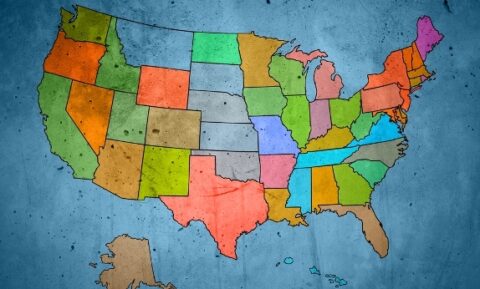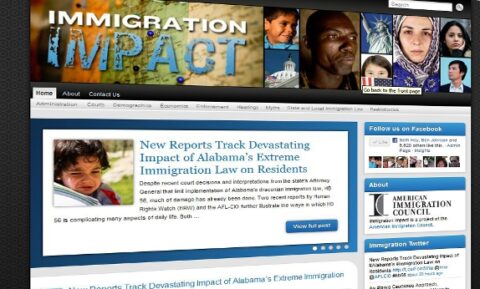State and Local

At Supreme Court, Arizona Gets Help from the Usual Suspects
Following the filing last week of Arizona’s brief defending SB 1070, the Supreme Court has received a barrage of briefs supporting the notorious immigration law from a none-too-surprising array of suspects. As might be expected, the arguments range from the predictable (that the Obama Administration fails to enforce the immigration laws) to the provocative (that states can carry out all immigration functions short of deportation) to the preposterous (that the Constitution allows Arizona to wage war against an “invasion” of immigrants). Of course, while neither Arizona nor their lawyers can be held responsible for the arguments of outside organizations, the briefs still offer a revealing look at the identities and motivations of SB 1070’s most ardent supporters. Read More

Report by Maryland State Panel Details Positive Approach to Immigration
A new report from the Commission to Study the Impact of Immigrants in Maryland concludes that immigrants bring a plethora of economic, social, and cultural contributions to the state of Maryland. The commission, which was created by the Maryland General Assembly, also warns against attempts to deal with unauthorized immigration through enforcement-only policies that needlessly sow fear and distrust in immigrant communities. Rather, the commission admonishes, “Maryland must remain welcoming to immigrants, and the state and its local jurisdictions should further strengthen its efforts to integrate immigrants into the economy and the community.” Read More

Tuition Equity Bills Continue to Build Momentum in State Legislatures
By ALVIN MELATHE AND SUMAN RAGHUNATHAN, PROGRESSIVE STATES NETWORK While federal efforts to fix our broken immigration system remain on hold, support is growing among state lawmakers for common-sense, proactive approaches that welcome immigrants and expand opportunity for all, both immigrant and native-born. Across the country, a growing and diverse number of forward-thinking state legislators are turning away from unconstitutional, divisive, and economically devastating approaches taken by states such as Arizona and Alabama. Instead they are advancing inventive policies that make economic sense for states’ bottom lines and uphold their reputations. One such approach, tuition equity, continues to gain political and popular support and build momentum in statehouses across the country. Read More

In Fight Over SB 1070, Arizona Makes an All-Too-Familiar Case to the Supreme Court
The Supreme Court case involving Arizona SB 1070 has officially entered the home stretch. On Friday, the Justices announced that oral arguments will take place on the fourth Wednesday in April, making it the final case to be heard this term. Yesterday, Arizona filed its much-anticipated brief at the Supreme Court, laying out its legal defense of the four provisions currently blocked by a preliminary injunction. To make its case to the Court, Arizona retained renowned attorney Paul Clement, a former Solicitor General who is simultaneously handling the legal challenge to the Affordable Care Act. But while the state may have brought in new lawyers, much of its brief reads like an all-too-familiar “study” from an anti-immigration organization. Read More

New Report Examines Dire Consequences of “Attrition through Enforcement” Immigration Strategy
Federal immigration enforcement resources have increased significantly in recent years, as have the number of deportations. Meanwhile, states have passed harsh immigration laws intended to crack down on unauthorized immigrants. Presidential candidate Mitt Romney has announced that he supports a policy of “self-deportation.” What do these things have in common? The belief that making daily life miserable for undocumented immigrants will result in “self-deportation”—or “attrition through enforcement.” A new paper today out of the Immigration Policy Center connects the dots between the strategy of “attrition through deportation” and federal and state anti-immigrant proposals and explains how attrition through enforcement has gone from being a catchy phrase coined by immigration restrictionists to a frightening reality in many parts of the U.S. Read More

More States Introduce Costly Immigration Enforcement Bills in 2012
Despite the devastating consequences of state immigration laws in Alabama and Arizona, legislators in other states have introduced similar enforcement bills this year. Legislators in Mississippi, Missouri, Tennessee and Virginia introduced an array of costly immigration enforcement bills in their 2012 legislative sessions—some which are modeled on Arizona’s SB 1070. While study after study continues to document how these extreme state laws are costing state economies, disrupting entire industries and driving communities further underground, state legislators clearly aren’t getting the message. Read More

Alabama’s Extreme Immigration Law Could Cost State Billions, Report Finds
Implementing Alabama’s extreme immigration law (HB 56) would be incredibly expensive. That is the bottom line of a new report by University of Alabama economist Samuel Addy entitled A Cost-Benefit Analysis of the New Alabama Immigration Law. According to the report, the law could cost Alabama up to $11 billion in GDP and nearly $265 million in state income and sales tax. The loss includes 1) implementation, enforcement, and litigation expenditures; 2) increased costs and inconveniences for citizens and legal residents and businesses; 3) reduced economic development opportunities because it creates a poor business climate; and 4) the economic impact of reduced aggregate demand due to some unauthorized immigrants leaving and therefore not earning and spending income in the state. Read More

Nativist Group Twists Facts on Effectiveness of Arizona’s Immigration Law
The Federation for American Immigration Reform (FAIR) has outdone itself when it comes to shoddy research. In a recently released report on “demographic changes” in Arizona, FAIR utilizes an almost random assortment of statistics to make its case that the state’s unauthorized immigrants are fleeing in droves thanks to get-tough immigration policies. The report occasionally pays lip service to the impact on unauthorized immigration of the 2008-2009 recession, as well as persistently high unemployment rates that continue to this day. Yet FAIR concludes, without evidence, that state-level immigration enforcement has been the single most important factor causing the decline of the unauthorized population. In reality, this conclusion is not supported by the data which FAIR presents. Read More

Immigrants, Latinos and Asians Contribute More to Your State Than You Think
Immigration has never been a numbers game. When people think of immigration in America, they likely call to mind fear-fueled myths perpetuated by immigration restrictionists, like “immigrants are stealing American jobs” or “immigrants are a drain on our system.” Sadly, numbers and facts have rarely been part of the discussion, especially as state legislatures continue to take immigration law into their own hands. Today, however, the Immigration Policy Center published 50 state fact sheets updated to show just how much immigrants, Latinos and Asians contribute to our country as consumers, taxpayers, workers, entrepreneurs and voters—facts state legislators would do well to consider before passing legislation that drives immigrants, undocumented and documented, from their state. Read More

Immigration Impact’s Top 11 Blogs of 2011
A review of immigration issues for 2011 reads like a rollercoaster of American politics. Some state legislatures, for example—backed by restrictionists groups—attempted to pass harsh enforcement-only immigration laws. Some states succeeded; others struck down these bills; and a few even passed progressive immigration laws like tuition equity for undocumented students. At the federal level, Congress failed yet again to take major action on immigration, but allowed a few humanitarian and refugee issues to pass. The Obama administration deported a record high number of immigrants, but at the same time issued prosecutorial discretion guidelines in an attempt to prioritize enforcement efforts. While our top 11 blog posts—those most read, shared and commented on in the past year—couldn’t possibly tell the whole immigration story of 2011, the list does provides an interesting snapshot of what moved people and prompted reactions throughout the year. Read More
Make a contribution
Make a direct impact on the lives of immigrants.
